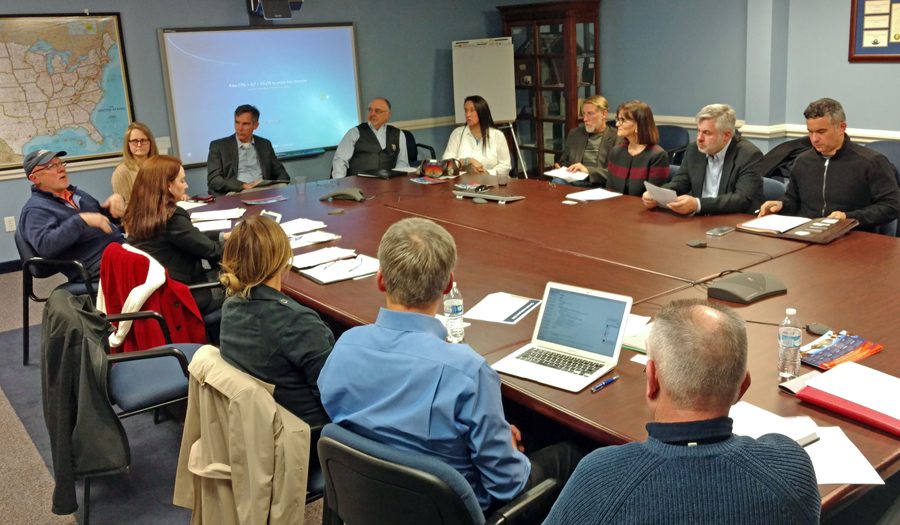
Home » Association works to encourage hiring of small, local businesses
Association works to encourage hiring of small, local businesses

March 13, 2019
The Tri-Cities Local Business Association is growing its
membership by focusing on building a strong relationship with Hanford
contractors, and keeping its lens on the future of the site, rather than its
past.
Most members of the nonprofit are second-tier
subcontractors focused on the cleanup of the U.S. Department of Energy site in
Richland.
“Many of our members are trying to diversify, and that’s
what we’re trying to help substantiate, given the experience of the work
activities on site, to leverage that expertise in other areas, outside of DOE
and Hanford,” said Steve Anderson, president of TCLBA.
The nonprofit was founded in 2003 with the goal of
encouraging DOE and its prime contractors to use smaller Tri-City-based
businesses for portions of larger contracts.
“The idea was to help ensure that the prime contracting
that came out had language to use small and local businesses, leveraging the
talent we have in the Tri-Cities versus out of town,” Anderson said. “We’ve got
a commitment to the companies here, to our community, since we live here and
work here.”
TCLBA member and president of Meier
Architecture-Engineering Paul Giever added, “Local business owners really drive
the economy and will stay here long after the ‘primes’ (prime contractors)
leave.”
The organization includes about three dozen large and
small businesses, as well as unions. Members include Babcock Services, Lampson
International and the International Brotherhood of Electrical Workers (IBEW)
Local Union 112.
“There are portions of these contracts that can be given
to smaller businesses, something of a civil engineering nature or environmental
effort, whereby monitoring wells, so that contracts could go out specifically
to small businesses and give them greater credibility for what they do, that
could be taken elsewhere,” Anderson said.
The TCLBA said it has a personal interest in seeing the
DOE and Hanford succeed, including the transition to a new, long-term mission
as cleanup of the former nuclear site winds down. This includes support for the
Department of Energy’s effort to reclassifying high-level waste.
“We think that’s an important element for many reasons,
including excessive costs for site cleanup,” Anderson said. “If they would go
ahead and classify it based on the constituents, as opposed to the reason or
the process, which was, in the past, why it was considered high-level, it would
make it a lot easier for us to clean up and dispose of in a more timely fashion
and, we think, accelerate cleanup.”
Members of the TCLBA meet monthly to listen to a speaker
and have the opportunity for networking, which could help its members develop
partnerships for future collaborative work. This is the portion of the
membership that Giever sees as the most beneficial.
“You need to go to the meetings to get the benefit. You
can see what opportunities are coming out, network with other businesses, and
see how your skills can be combined with others to make a run at proposals,”
Giever said.
“This is an association of businesses that all have the
need to grow their own area of expertise, but become a stronger voice as a
community of businesses to help negotiate language in contracts or requests to
hear from some of the prime contractors as to what type of workload may be
coming and how they see the timing and sequencing of those activities so that
support industries are aligned with those needs and are recognized with that
expertise,” Anderson said. The TCLBA has provided a forum for developing
programs that enhance the overall economy of the region.
Meetings also
give members the opportunity to hear from local, regional and federal
politicians on matters related to work in the Tri-Cities. State lawmakers and
U.S. Congressman Dan Newhouse have spoken to the group in the past, as well as
DOE leaders.
The TCLBA has
just a few people on the payroll, including an executive director.
Membership dues
are scaled based on the size of the business, ranging from $50 a month for
organizations with fewer than five employees, to $200 a month for those with 26
employees or more.
Anderson said
the nonprofit has generally hovered around 30 to 40 members, but there’s room
for growth.
“The whole idea
is to help breed sustainable support for our companies and our community as
Hanford slowly winds down,” Anderson said. “The idea is that we are cleaning
things up, things are advancing. We think there’s definite value in what we
bring and in bringing people together.”
Tri-Cities Local Business Association: tricitieslba.com; Facebook.
Local News B2B
KEYWORDS march 2019





